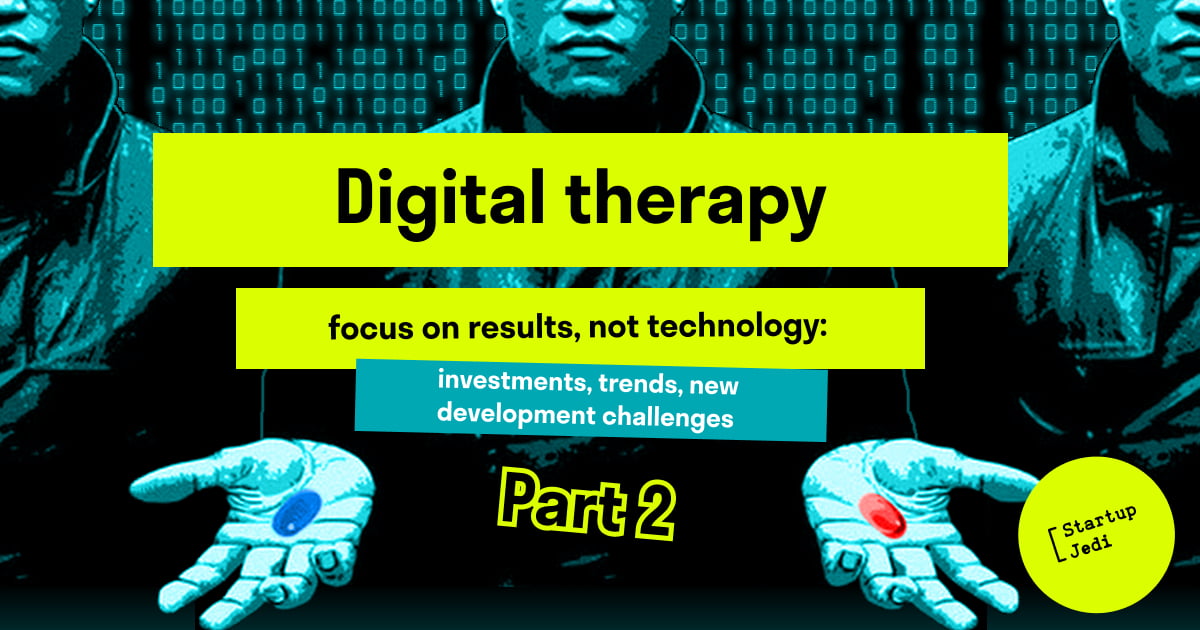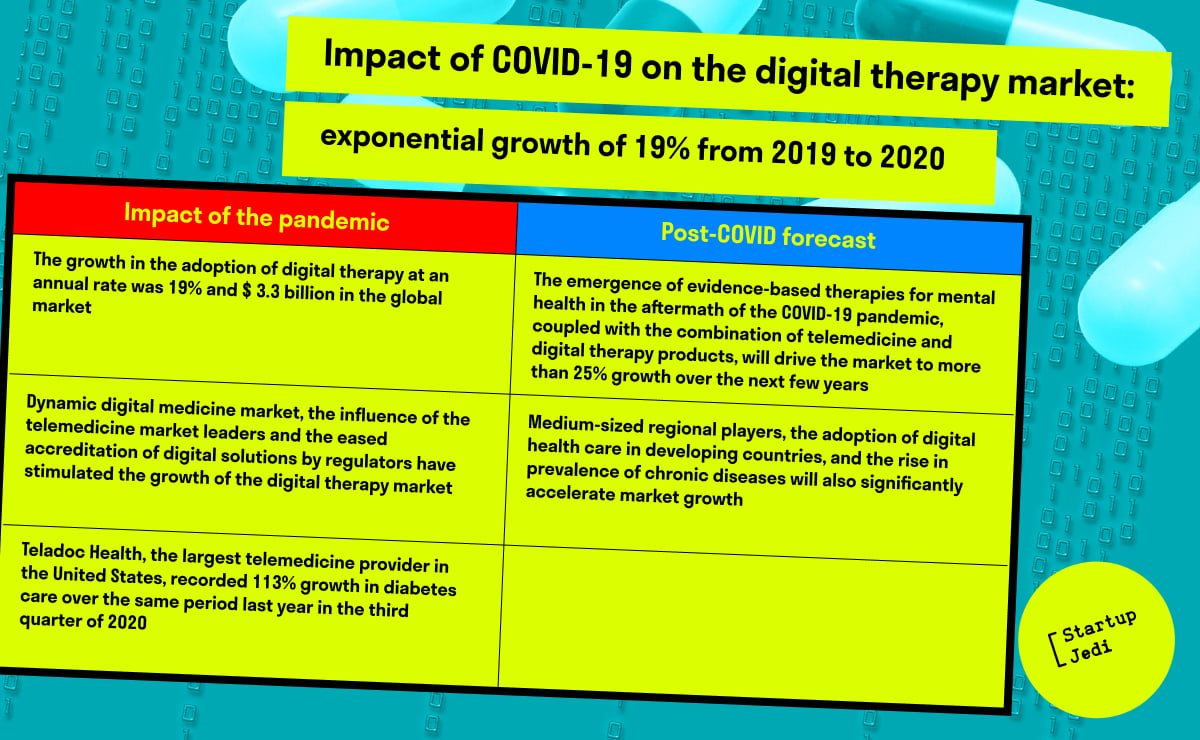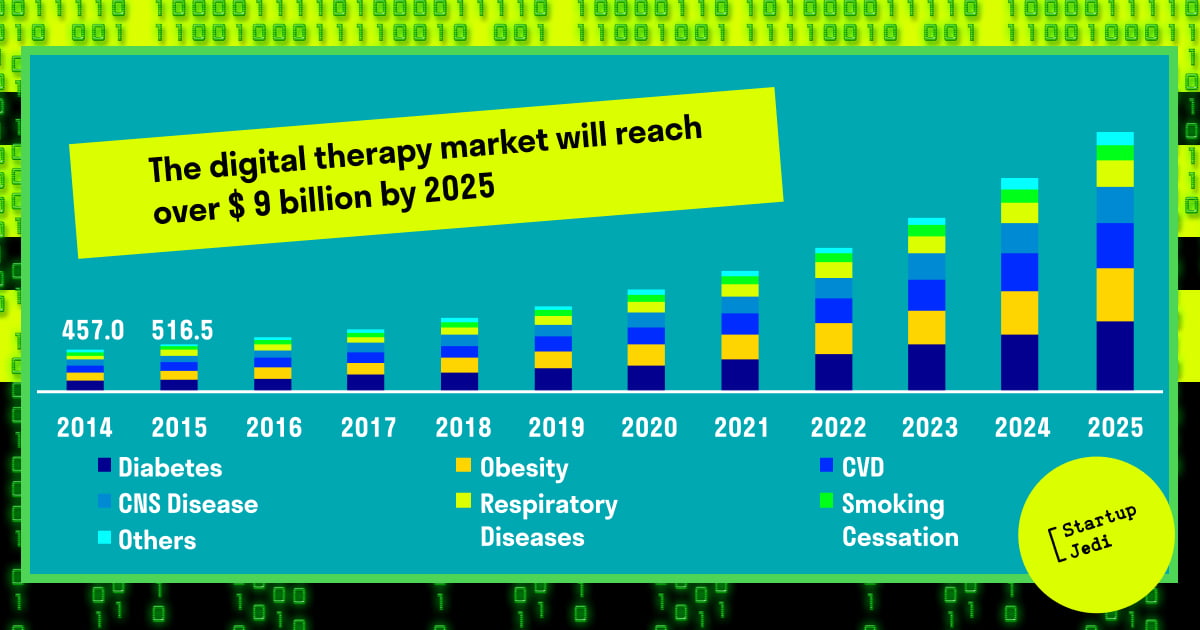
Startup Jedi
We talk to startups and investors, you get the value.
In the first part of the article, we defined the concept of digital therapy, talked about why we need it and what value it has in the treatment of patients. In the second part today, we will talk about the state of the market, investments in startups and prerequisites for the development of this direction.

Startup Jedi
We talk to startups and investors, you get the value.
Digital therapy helps people make positive and lasting health changes that can be just as good or even more effective than medication.
In recent years, the digital therapy space has made great strides and is growing rapidly. According to Grand View Research, the global digital therapy market size will reach $19.1B by 2028. The market is expected to expand at 23.1% from 2021 to 2028. Key drivers of this growth are the increasing number of chronic diseases, digitalization, the demand for innovative and affordable healthcare, and government healthcare initiatives.
Digital health has gone all the way from being an innovation to becoming essential in 2020. It has swept across nearly all areas of health care, accelerated by the COVID-19 pandemic.
...

In response to the impact of the COVID-19 pandemic and its implications for mental health, the Food and Drug Administration (FDA) has issued guidelines to expand and promote digital therapy for mental health. The growth of public and private initiatives is another factor that is expected to drive market growth.
The digital therapy market will reach over $9B by 2025.

...

Here are the most promising and clinically significant projects.
A German company Ada Health announced a $90M investment from the pharmaceutical giant Leaps by Bayer jointly with Bayer’s Investment Division, as well as Samsung Catalyst Fund, Vitruvian Partners, Inteligo Bank and Mutschler Ventures. Besides, Bayer will support Ada Health platform with its expertise in science and innovation.
This platform is designed to assess health status and provide medical care based on artificial intelligence. It helps users understand their symptoms and then move on to finding the right specialist and relevant treatment. Ada Health strives to reduce the time it takes to make a diagnosis by providing practical medical advice and using personalized patient data to support disease prognosis and prevention.
Since its launch, Ada Health has completed over 23M patient visits and symptom assessments. The company partners with key healthcare stakeholders, insurers, life sciences companies and laboratories to integrate symptom assessment and patient navigation experiences and solutions into a range of digital technologies that can help them.
...

Besides investment support, Bayer and Ada Health are discussing the possibility of a long-term strategic partnership to support the development of the company and digital health technologies. The funding will be used to further develop Ada Health’s symptom assessment technology, expand the company’s US presence, and accelerate its growth in personalized health solutions. This experience of cooperation of Ada Health is an impetus in the development of a patient-centric model of healthcare, which can also increase the competitiveness of this segment of the digital medicine market.
Heru is the developer of portable AI-based vision diagnostics and enhancement software that has raised $30M under the leadership of D1 Capital Partners with participation from SoftBank Ventures Opportunity Fund and private investors.
FDA registered, Heru’s platform is designed to diagnose a wide range of eye conditions with the ability to automatically detect them and support clinical decision-making. This is especially relevant if you consider that today about 450 million people worldwide suffer from eye diseases.
emocha Health is a medication adherence solution for patients with chronic and infectious diseases. The company raised $6.2M in Round A funding, led by Claritas Health Ventures. Other contributors included Healthworx, Kapor Capital, PTX Capital и TCP Venture Capital.
Emocha Health has seen 300% revenue growth over the past year in response to demand from healthcare organizations. The platform is helping to solve one of the most important health problems — adherence to treatment, which saves $300B a year in unnecessary hospitalizations. More than 50% of drugs are misused, making adherence the most important modifiable factor in chronic disease management.
The AI-powered mental health platform Wysa has raised $5.5M from W Health Ventures through Google Assistant investment program and pi Ventures. Wysa helps in combating stress, depression and anxiety with the help of a bot. As of now, Wysa has helped over 100M patients in 65 countries around the world.
VieCure has raised $25M from Northpond Ventures. The VieCure platform is a real-time clinical decision support system that combines the latest evidence, clinical test data with patient data to help oncologists, clinical oncologists, hematologists, and clinical tests specialists create personalized treatment plans.
pulseData has raised $16.5M from Bain Capital Private Equity and Two Bear Capital. pulseData provides a suite of artificial intelligence solutions focused on predictive algorithms for chronic kidney disease and other chronic diseases. In addition, pulseData algorithms predict which patient populations are prone to developing kidney failure, allowing early intervention. pulseData is part of the US Medicare Advantage program.
...

The digital therapy market will continue to develop and actively integrate into clinical medicine. Many doctors will diagnose and treat patients remotely, as well as prescribe digital therapy as a treatment component for patients in complex therapy with classical treatment methods.
There is an evidence base for benefits for patients using digital therapy related to clinical effects, as well as economic benefits for healthcare systems.
Today, there is no doubt that digital programs are a key element of healthcare. Health care systems have already begun to implement them, and legislative changes are underway on the part of regulators.
Separately, it should be noted that we cannot solve the healthcare crisis without solving the problem of an uncontrolled epidemic of chronic diseases. All advances in digital therapy are focused on this and are aimed at changing the outdated approach to this issue and shaping a new way of thinking for both patients and doctors. The industry is at the very beginning of the journey, but data and experience are already accumulating.
...

Ресурсы: PubMed Central, American Society of Clinical Oncology — Clinical Cancer Informatics, MobiHealthNews, Crunchbase, VentureBeat, Noteworthy — The Journal Blog, Healthcare Information and Management Systems Society, StartUp Health — health transformer, Business Wire
Facebook: facebook.com/StartupJedi/
Telegram: t.me/Startup_Jedi
Twitter: twitter.com/startup_jedi
Comments